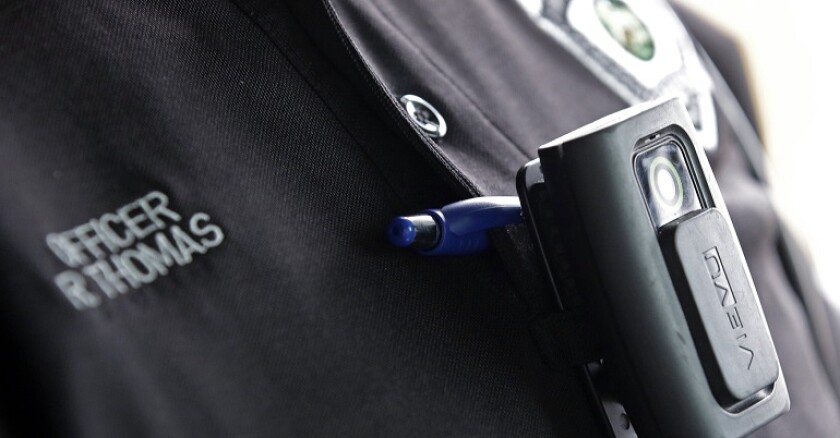Trouble is they only have a matter of months to come up with hundreds of thousands of dollars along with developing the rules before a new state law goes into effect.
"We wish there was more time. We wish if they wanted to mandate body cameras that (the state) had provided funding," said Kennewick Lt. Aaron Clem.
In Richland, Chief John Bruce brought the issue up last week to the city council as the department prepares to ask for federal money to help buy the cameras.
And Franklin County Sheriff Jim Raymond is preparing a proposal to take to county commissioners to fund body and dashboard cameras for patrol cars.
Benton County leaders are also putting together a plan to buy cameras, Sheriff Jerry Hatcher said.
While most Tri-City police agencies have held off on using the new technology, the Pasco Police Department started using body cameras in 2018, after years of testing and have been happy with the outcome.
New Washington law
The new law goes into effect in January and requires police officers to have a video and audio recording of any "interrogation" involving a felony or a juvenile.
For police there is a difference between interviews and interrogations. Interviews can happen with anyone at a scene including witnesses or victims. Interrogations happen when someone is suspected of committing a crime, and they are being questioned about it.
The state House passed the measures 56-41 and the Senate agreed on a 28-20 vote.
The bill was one of several aimed at reforming police behavior across the state.
Supporters testified that the law would demonstrate that police are not badgering the person being questioned, and would limit the chance of a forced confession.
But Clem said the problem is that when police are on the scene of a crime, an interview can become an interrogation quickly. Bringing every potential suspect into the police station to use the camera equipment there would not be viable.
"The vast majority of these cases occur on a street, in a car, in a parking lot or in a house," he said.
This makes body cameras the best solution, for now, Clem said.
Body cameras in Tri-Cities
In the Tri-Cities, Pasco is the only police department to use both body and dash cameras and Washington State Patrol has dash cameras in their cars.
Pasco started the widespread use of the equipment in 2018 after years of testing and developing policies and procedures for when to use them.
They have said the near immediate ability to review video has let them see if policies and procedures are being followed.
Other departments have previously shied away from them citing the expense to contract for the equipment and to manage the public records.
While some believe body cameras build trust between the community and the police, Clem said Kennewick police have always felt officers relationships with people build trust.
Richland started considering body cameras following a shooting near the bypass highway on Feb. 1, Chief Bruce led the Frisco, Texas, department where they started using body cameras during his time with the department.
While Bruce and other Richland officers support having body cameras, he told council members in March that they are not a perfect tool for judging officer actions.
"They have the ability to see things that an officer may not be able to see, especially in low-light conditions," Bruce said. "The camera may, in fact, see more than what the officer did."
The officer is also dealing with stress, fear and how the brain deals with stress at the time.
Camera expense
Bruce brought up the cameras at recent Richland City Council meeting, as the department plans to ask the Department of Justice for half of the money to buy 68 cameras and train the officers. The city will likely learn in the fall if they will get the money.
When Bruce prepared his report this spring, he estimated it would cost the city nearly $400,000 in the first year of having the cameras.
He also suggested hiring more staff to handle an increase in the number of public records requests. He expects the new clerks and an administrative sergeant will cost another $362,000 a year.
"As a council we can pat ourselves a little on the back that we were a little ahead of this issue. I think we saw this coming down the pipeline," Richland Mayor Ryan Lukson said. "It's nice that we're going to have an opportunity to apply for grant ... and hopefully defer some of the costs."
For Franklin County, the sheriff's office is looking at mirroring what Pasco police uses, and expect the startup costs will be about $200,000.
"Currently Cmdr. (Monty) Huber is putting together a presentation for the commissioners," Raymond said. "They are going to be the ones cutting loose with the money or not. I suspect they will though. The goal is for all of the Tri-Cities agencies to utilize the same platforms in order to piggyback off each other."
Kennewick hasn't determined how it will handle paying for the new cameras. Any plan has to involve the city manager and finance departments.
Clem said body cameras aren't bad, but rather the department always had items it felt were more critical on its agenda.
"If we can find another viable option, we will seriously look at that," Clem said. "It's law and now we have to figure out a way to comply with it."
© 2021 Tri-City Herald (Kennewick, Wash.). Distributed by Tribune Content Agency, LLC.








